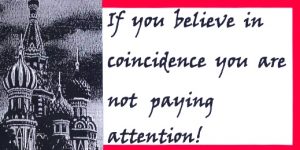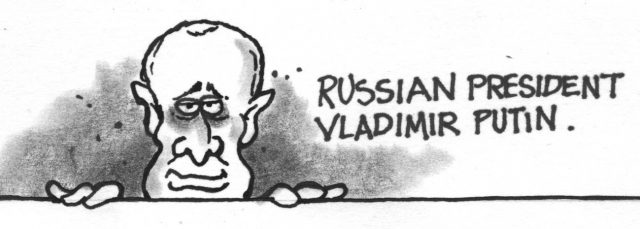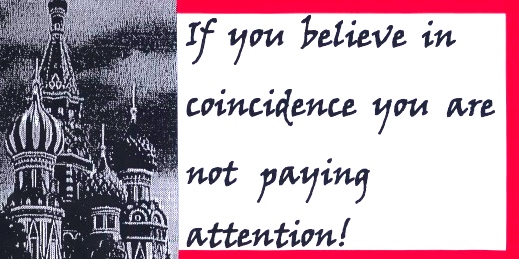
By Dan Peak
The Commoner Call (11/27/17)
“Everything the Trump campaign told you about the connections between Trump and Russia was a lie.”
– Steven Harper, Moyers & Company
Dear Fellow Readers,
Lies, all lies. NPR reports Putin says, “those aren’t Russian forces in Crimea”. Trump says, “There was no communication between the campaign and any foreign entity during the campaign.”
Trump-Russia. Maybe a good analogy is a complex paint-by-numbers that is presented one cell at a time. For the longest time the exercise is filling in seemingly random blotches of color. With persistence there is a good idea of what the final image might be, but at the same time the canvas keeps getting larger in an Alice in Wonderland kind of way. Oh, and the all colors are labled in their Russian names.
Two emerging themes:
1) the Trump-Russia collusion picture is taking shape and Trump’s denials and deflections look increasingly obvious, and;
2) the media has been incredibly supportive of the Trump denials to date.
As The Guardian reports,former Trump campaign manager Paul Manafort is a good example of both: The Shifting Public Face Of The Trump/Manafort Relationship.
In the early days of Manafort’s reign as Trump campaign manager, Trump’s comments back in March 2016 were exclamatory:
“Paul is a great asset and an important addition … Paul Manafort, and the team I am building, bring the needed skill sets to ensure that the will of the Republican voters, not the Washington political establishment, determines who will be the nominee for the Republican Party.”
Manafort was going to present Trump in a new light, as a Washington outsider that was truly presidential.
But Manafort resigned in August 2016, in reaction to news about secretive off-the-book payments from his Ukraine client, the pro-Russian political party, Party of Regions.
“Corruption investigators in Ukraine say an illegal, off-the-books payment network earmarked USD 12.7 million in cash payments in 2007-2012 for Paul Manafort, now Trump’s campaign chairman.”
A year later, after the July 2017 FBI morning raid of Manafort’s residence, Trump had this to say (from August 2017):
““I know Mr. Manafort. I haven’t spoken to him in a long time, but I know him. He was with the campaign, as you know, for a very short period of time – relatively short period of time. But I’ve always known him to be a good man.””
Everyone that leaves the Trump team leaves diminshed; lessened. But to stay on track, let’s look at how Politico covered the Manafort resignation in August 2016.
“Manafort had increasingly come under fire over his past lobbying work for pro-Russian Ukrainian oligarchs — which was fundamentally at odds with Trump’s boasts about being free from moneyed interests — and for the sloppy nature of the Republican National Convention, which Manafort oversaw.”
At this point in history, this reads like a Trump campaign press release. The presentation is ‘Manafort is the problem and became a distraction to the Trump campaign’, nothing about what the Manafort relationships might say about Trump-Russia collusion, not even a hint.
In all fairness, who even remembers where the Trump-Russia story stood in August 2016. Thanks to Politico, we can easily take a look: The Definitive Trump-Russia Timeline Of Events.
Here’s a comparison of stories at the time using the Politico timeline:
- July 26: Intelligence officials inform the White House that they have “high confidence” that Russia is behind the DNC hacks.
- July 27: Trump calls on Russia to hack Hillary Clinton’s emails from the private server she used as secretary of state.
- July 31: An interview airs on ABC in which Trump says of Russia’s annexation of Crimea: “But you know, the people of Crimea, from what I’ve heard, would rather be with Russia than where they were. And you have to look at that, also.” Trump also says in the interview that he was not involved in efforts to defeat an amendment to the Republican platform that would have added more aggressively pro-Ukraine language.
In an interview on NBC’s “Meet the Press,” Paul Manafort says that the effort to block the pro-Ukraine amendment “absolutely did not come from the Trump campaign. … No one, zero.”
The DNC hacked emails had been released by WikiLeaks and U.S. intelligence groups pointed to Russia as the party behind the hacking. Trump issued a public plea at an election rally to find the ‘missing’ Clinton emails.
Two years after the 2014 Russian annexation of Crimea, a part of Ukraine, and with Manafort, the former head of Ukraine pro-Russian president Viktor Yanukovych who fled to Moscow following protests in Kiev, Trump and Manafort are promoting a Trump-Russia line about how happy people in Crimea are to be part of Russia.
- On August 14: The New York Times publishes an exposé on Ukrainian documents that appeared to show that $12.7 million in cash was earmarked for Manafort by the Russia-aligned Party of Regions.
- On August 17: Manafort resigns as Trump campaign manager.
Yet on August 19, 2016 (the linked article above) Politico reports on the progress Trump is making in reshaping his campaign team while offering that Manafort’s work with pro-Russian Ukrainian oligarchs “was fundamentally at odds with Trump’s boasts about being free from moneyed interests “.
Manafort is the perfect example for demonstrating:
- 1) the Trump-Russia collusion picture is taking shape and Trump’s denials and deflections look increasingly obvious, and;
- 2) the media has been incredibly supportive of the Trump denials to date.
*****
Here’s more on Manafort and his role as the Trump-Russia connection to Putin and the Russian oligarchs. McClatchey reported Exclusive: Manafort Flight Records Show Deeper Kremlin Ties Than Previously Known.
If you were Trump, why would you want Manafort as your campaign manager; someone who worked outside the U.S., immersed in Ukrainian politics for the previous decade?
“Political guru Manafort took at least 18 trips to Moscow and was in frequent contact with Vladimir Putin’s allies for nearly a decade as a consultant in Russia and Ukraine for oligarchs and pro-Kremlin parties.
“Even after the February 2014 fall of Ukraine’s pro-Moscow President Viktor Yanukovych, who won office with the help of a Manafort-engineered image makeover, the American consultant flew to Kiev another 19 times over the next 20 months while working for the smaller, pro-Russian Opposition Bloc party. Manafort went so far as to suggest the party take an anti-NATO stance, an Oppo Bloc architect has said.”
Two take-aways:
- 1) Here is more confirmation that Manafort’s Trump campaign role was the same as his role in Ukrainian politics – the front man and connection to Putin and the oligarchs, and;
- 2): Trump-Russia news stories now have a different tone. Here are comments from Daniel Fried, an assistant secretary of state in the Bush administration:
““He’s at best got a conflict of interest and at worst is really doing Putin’s bidding,” said Fried, now a fellow with the Atlantic Council.”
At long last, Trump and Manafort no longer get an automatic free pass from the media given what is now known about Trump-Russia collusion.
*****
Though often news is presented without context. Here’s an example where Seth Abramson offers a 40-entry threaded tweet shredding a New York Times story from Thursday (11/24) about the falling out between Trump’s and short-lived Former National Security adviser Michael Flynn’s legal teams. Here are a few of the points Abramson offers about the poor reporting by the The New York Times:
4/ The NYT then, in the second paragraph here, completely misstates the scope and purpose of the Mueller probe as it was authorized by the DOJ. Readers reading this paragraph would be completely misinformed about what Mueller has been tasked to do here. And it matters to America. (The NY Times paragraph referenced is: Mr. Flynn’s lawyers had been sharing information with Mr. Trump’s lawyers about the investigation by the special counsel, Robert S. Mueller III, who is examining whether anyone around Mr. Trump was involved in Russian efforts to undermine Hillary Clinton’s presidential campaign.
5/ This is what Mueller is *actually* authorized to investigate: not whether Trump’s campaign aided efforts to undermine Clinton, but a) ANY links between Russia and Trump’s campaign, b) ANY new matters that arise from that investigation, and c) ANY attempts to hinder the probe.
6/ Given that the scope of Mueller’s authority is a national issue—as before this is all over, Trump will seek to fire Mueller—the New York Times adopting the Trump campaign line on Mueller’s authority (“we’re only in trouble if we actively helped Russian hacking”) is a problem.
Here’s how Abramson wraps up his thread:
39/ The NYT *must* … also must do *much* better at having its reporters understand the full scope, sweep and complexity of this story.
40/ If you compare how this case has been handled and covered—by law enforcement and media—versus how a *typical* criminal case is handled and covered, you see that both investigation and coverage are *unbelievably pro-defendant*—pro-Trump.
So much Trump-Russia collusion news is offered superficially. That is changing for the better but as the New York Times article demonstrates – not always.
*****
Here’s a more encouraging perspective from Bill Moyers: The Trump-Russia Story Is Coming Together. Here’s How to Make Sense of It.
Moyers interviews Steve Harper, also of Moyers & Company, and a retired lawyer who, “has turned his experience, talent, and curiosity to monitoring for BillMoyers.com the bizarre and entangled ties between Vladimir Putin and Donald Trump and the murky world of Russian oligarchs, state officials, hackers, spies, and Republican operatives. “ Harper has also invested his effort in building a 700-entry, interactive timeline of Trump and Russia developments.
Harper starts by delineating the dimensions to the Trump-Russia story. He starts with the number of documented interactions between the Trump campaign and Russians (below is a link to a CNN story covering this summary). He follows with a statement about obstruction. Harper adds, “And then there’s a third component, which is in a way the most insidious — the willingness of the congressional GOP to be complicit in all of this.”
Harper then ties these dimensions together to get at the bigger picture of Trump-Russia.
Harper: Three different strands have now begun to coalesce. There’s a core strand running through it that I call the “follow the money” strand. Perhaps most of what happened throughout the campaign, if you view it from Vladimir Putin’s side of the transaction, looks quite reasonable and makes a great deal of sense. Putin wants to eliminate sanctions on Russia, both because they affect him personally in a financial way and because they affect his country’s economy in a big way. So you dangle in front of Trump the prospect of a Trump Tower in Moscow. We always knew that Trump wanted a Trump Tower in Moscow, because Trump told us he did. But what we didn’t know was that during the campaign, the Trump organization was actively negotiating for such a development.
Harper touches on the “political operatives” that made all this happen but who are now presented as being “unimportant” once they are gone – Manafort is an example. Harper acknowledges the “digital strand” that was headed by Jared Kushner and included resources like Cambridge Analytica (Robert Mercer owned; Mercer is a billionaire, huge financial backer for the Trump campaign, owner of Breitbart News) and Donnie Jr.’s communications with WikiLeaks as part of this.
Moyers then directs Harper’s attention to, “a new book out this week by Luke Harding, once the Moscow correspondent for The Guardian of London. The title is Collusion: Secret Meetings, Dirty Money and how the Russians Helped Donald Trump Win.”
Moyers: Much of what Harding reports in his book is circumstantial, but it adds up to what is fairly damning evidence. You’re the lawyer — how much can circumstantial evidence be introduced in an argument in a trial?
Harper: Plenty. There are lots of people sitting in jail who were convicted on circumstantial evidence. In fact, how often is it that there is actually what you would call eyewitness or direct evidence of criminal behavior, except in a situation where you can get one of the co-conspirators to turn state’s evidence and squeal on the others? People talk about circumstantial evidence as if there’s something terrible about it. Circumstantial evidence is the way most people go about proving their cases, whether they’re civil or criminal cases. And what separates circumstantial from direct evidence isn’t even all that clear. Would you say that the email exchanges between Donald Trump Jr. and the lawyer who was supposed to come to Trump Tower with dirt on Hillary Clinton were circumstantial evidence or direct evidence? It’s certainly direct evidence of Donald Trump Jr.’s intent when he says, “If you have what you say you have, in terms of dirt on Clinton, I love it.”
Some people keep saying there’s there’s no collusion. Trump’s favorite expression is “No collusion. No collusion. No collusion.” All right, let’s talk about something else. Let’s talk about something the law recognizes as conspiracy or “aiding and abetting.” Let’s talk about a conspiracy to obstruct justice. In that respect, Trump’s own tweets become evidence. So it’s not as clear as I think some of the talking-head pundits would like to make it, that no collusion means the end of the inquiry. That’s just wrong.
Harper suggests the evidence of collusion makes for a sound case, then what next?
Moyers: So, to sum up for now: What’s the most innocent explanation for everything we know? What if all of this was simply Trump’s inexperienced people trying to establish diplomatic rapport with the Russians and hoping to reset America’s connection with Moscow?
Harper: Well, the most innocent explanation would be a level of incompetence and ignorance and stupidity that I honestly don’t think anyone could credibly believe, because the most innocent explanation is that Russia was launching a very sophisticated, multipronged intelligence operation and succeeded, but they succeeded because of the blind ambition and greed of the Trump organization coupled with a lack of judgment and intelligence and a fundamental failure to take into regard anything that would remotely look like patriotism when it came to the defense of democracy, subjugating all of that to the need to win. That’s the most innocent explanation. And I just don’t think all of them are that stupid.
Moyers: So what’s the most damning explanation for everything we know?
Harper: The most damning explanation is that the Russians launched a sophisticated intelligence operation. They found willing partners up and down the line throughout the Trump organization. And up and down throughout the Trump organization, as the details of that intelligence operation became known, the participants lied about it, lied about its existence, lied about their personal involvement in it and now they are all facing serious criminal jeopardy as a result.
Moyers: One more: I assume most people believe Russia’s interference in the election last year is a bad thing, a serious offense, but is it possible that by treating Vladimir Putin and his cronies as an existential threat, we’re playing directly into Putin’s hands and making him appear a more significant figure in the world than he really is?
Harper: Well, he’s already achieved that, but the problem is, what’s the alternative? Back in January, John McCain and Lindsey Graham were on national television acknowledging the seriousness of the Russian interference. McCain called it the cyber equivalent of “an act of war.” And if you acknowledge and recognize the existential threat, do you sit back and let the let the next thing happen in 2018 that Vladimir Putin wants to do? Remember, we have elections coming up next year. The uniform view of US intelligence is unambiguous, and if you don’t view it as an existential threat then you’re willing, I think, to sacrifice democracy.
There is much more to the discussion but Moyers poses on last question, “Is it possible…we are playing into Putin’s hands and making him appear…more significant in the world than he really is?”
And that’s exactly a concern of many Russian pro-Western liberals. And maybe a similar concern of U.S. liberals who bemoan the focus on Trump-Russia collusion: Why Putin’s Foes Deplore U.S. Fixation on Election Meddling.
The criticism offered here is that U.S. focus on Trump-Russia collusion reinforces a Putin image of invincibility. The New York Times interviews Leonid Volkov, the chief of staff for opposition leader Aleksei Navalny:
“The Kremlin is of course very proud of this whole Russian interference story. It shows they are not just a group of old K.G.B. guys with no understanding of digital but an almighty force from a James Bond saga,” Mr. Volkov said in a telephone interview. “This image is very bad for us. Putin is not a master geopolitical genius.”
Putin both denies Russian involvement in the U.S. election in favor of Trump while also reveling in his achievement.
From the last edition of the Russia Monitor Jake Bernstein, reporter and author of “Secrecy World” commented to Terry Gross on Fresh Air about Manafort’s ties to Russian oligarchs with money in offshore accounts:
“Trump’s cabinet – how they use the secrecy world, too, you know, because they’re all incredibly wealthy. They are the American version of the Russian oligarch.”
Harper’s response to questions of consequences resulting from an ‘over-focused’ Trump-Russia narrative is, “what’s the alternative?” Offering this about Putin’s reputation, “he’s already achieved that”. Worth repeating, Harper adds:
“The uniform view of US intelligence is unambiguous, and if you don’t view it as an existential threat then you’re willing, I think, to sacrifice democracy.”
That’s a great place to end – we’re not willing to sacrifice our democracy.

*****
You can access and review the list of Trump-Russia contacts at: By The Numbers: The Trump Orbit’s Contacts With Russians.

